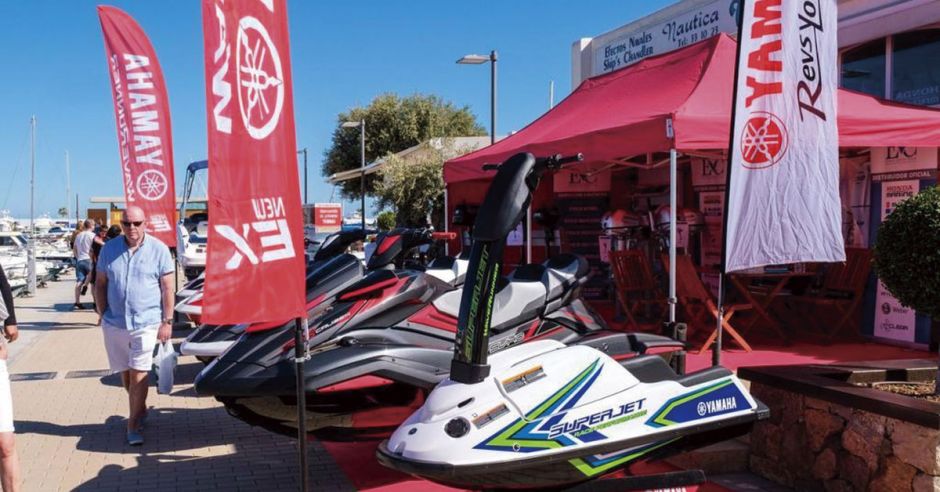- News
- A mooring for a 12-metre boat costs five times more in Ibiza than on the mainland
A mooring for a 12-metre boat costs five times more in Ibiza than on the mainland

A mooring in Ibiza for a boat of 12 meters in length costs «an average of 25,000 euros». In the Peninsula, "5,000 euros". This is the example set by Ramon van der Hooft, president of the Pimeef Nautical Association, to demonstrate that the sector in Ibiza "is losing competitiveness" compared to other destinations, one of the issues analyzed by the association in a meeting held last week.
Van der Hooft considers that "the high prices of moorings and the high taxes levied on activity" in the Pitiusan ports are the cause of this loss of competitiveness: "And even with those prices, there is a huge lack of moorings in the Pitiusas," he says. As a result, boating is "increasingly elitist," he admits. "From our association," he explains, "we fight against this and we have always opted to create more ramps and more dry marinas, which would allow us to be more competitive in terms of prices." That way, "residents would also have opportunities to go out with a boat to the sea."
Ibiza, the 'top' of expensive
They have, he says, been asking politicians</strong for years>: "They always tell us that they think it's a good idea, but we have not yet seen a firm commitment on their part."
<>There are other ports in the Mediterranean "that are very exclusive, such as Antibes (next to Cannes), or Porto Cervo (Sardinia)", details Van der Hooft: "But Ibiza is at the top of the marinas". Santa Eulària and Sant Antoni "have somewhat more moderate prices", but the one in Ibiza takes the cake with those 25,000 euros per year for a mooring of 12 meters in length, "a very high expense".
Charter of the Peninsula
Another of the main problems suffered by the sector and that also affects competitiveness is that of intrusion by the charter fleet that does not have its base of operations in Ibiza: "They are boats that come to our waters without moorings and that stay anchored in the coves. That doesn't mean they're pirates charters. The law does not require you to need a home port in the Balearic Islands to have a charter license. But it is unfair competition that makes us lose competitiveness." In the home port, Ibizans pay for maintenance facilities and offices, "while a company that operates from the Peninsula and only works here for two or three months has much lower expenses," says Van der Hooft.
Like the rest of Ibiza's sectors, sailing also has difficulties to "cover templates with qualified personnel, as the island does not have training centers that teach the Vocational Training cycle in maintenance of pleasure boats". Van der Hooft explains that, "in the long term, if there is a line of studies, every year there will be people who come out of those cycles." The best thing is that "they are usually people who have solved the housing problem". That is, precisely, the real headache they face: "This year we are suffering a lot to be able to accommodate the workers who come on season from the Peninsula. Many companies have begun to acquire flats or rent them. But the prices are very high."
Coming to Ibiza must compensate
Those technicians who come from the Peninsula "often think about it because where they live they also have work and more facilities to find accommodation. For someone to do the season in Ibiza, they have to be compensated."
In addition, the worker "holds the company responsible" for this serious problem in order to find a place to reside. That is, he claims to be compensated for the extra cost of the house: "Before they paid 500 euros for a room, but now, with luck, they find it for 800 euros. It is normal that they expect that difference, that loss of purchasing power, to be reflected in the payroll." In this regard, Van der Hooft comments that all nautical companies in Ibiza pay "above what the agreements mark", although now they have to "stretch much more to be able to cover the workforce due to the increase in housing prices". "Basically," he adds, "it is not that we pay the worker more to take more money. What we are doing now is paying him more so that we can compensate for that speculation."
"There were no boats for the 2023 Boat Show
One of the decisions taken last week by the association is to hold the Boat Show in April 2024, after it was cancelled the last four years. Why hasn't it been held in 2023, once the health crisis is over? "Because there were no ships. We could not exhibit without boats", explains Ramón Van der Hoof, president of the Nautical Association of the Pimeef: "In the pandemic and after this, everyone wanted to bet on the sale of ships, which went up a lot. But production was affected by the lack of components, as in the automotive sector. That meant that for a couple of years all the boats available were sold." But there was nothing to expose. In fact, "a year ago, the delivery time was between one and two years." Production "is already normalizing", hence the association has decided to convene the Boat Show again for 2024: "For 2023 it did not make sense because there were no boats available".
Source: Diario de Ibiza


